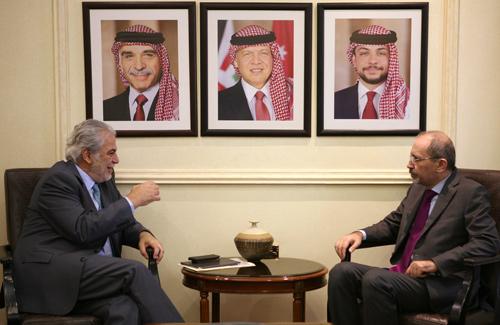You are here
Prince Ali discusses crisis management cooperation with EU commissioner
By JT - Dec 09,2018 - Last updated at Dec 09,2018
AMMAN — HRH Prince Ali, the director of the National Centre for Security and Crisis Management (NCSCM), on Saturday met with European Commissioner for Humanitarian Aid and Crisis Management Christos Stylianides.
Talks tackled areas of cooperation and coordination and training programmes between the EU and the NCSCM, and the need to organise joint programmes for managing crises, particularly humanitarian and natural ones.
Prince Ali stressed the “strong ties” between Jordan and the EU on various levels, and the importance of increasing coordination, cooperation and the exchange of expertise between the centre and the EU in relation to dealing with disasters.
He also commended the EU’s efforts in dealing with international crises, as well as providing various kinds of support to Jordan, the Jordan News Agency, Petra, reported.
Stylianides was briefed on the NCSCM’s mandate and its global crisis management policy. He praised the centre’s work procedures in dealing with risks and disasters.
Also on Saturday, Foreign Minister Ayman Safadi discussed with Stylianides means to enhance cooperation between the Kingdom and the EU.
Safadi and Stylianides highlighted the importance of taking the Jordanian-EU partnership to a new level, according to a Foreign Ministry statement.
The EU official commended the Jordanian role in efforts seeking regional security and stability and the “distinguished” model it has set by hosting Syrian refugees, adding that the EU considers Jordan a key partner in the Middle East.
Safadi said that the Kingdom values its partnership with the EU and expressed Jordan’s keenness on sustaining cooperation and coordination with the union, commending the EU’s support to help Jordan bear the burdens of the Syrian refugee influx.
The two officials also reviewed regional developments and their repercussions on the Kingdom and the EU, as well as the developments related to the Palestinian-Israeli conflict.
The minister stressed that the shared goal of realising regional security and stability cannot be achieved without ending the occupation of Palestine and resolving the Palestinian-Israeli conflict based on the two-state solution.
In this regard, he praised the EU’s stance in support of the two-state solution and highlighted the importance of the European role in finding political prospects that can push forward the peace process.
Safadi also called on the international community to continue honouring its pledges towards Syrian refugees, warning at the same time of the dangers of cutting assistance for refugees and host countries.
He called for providing the necessary support to the Kingdom to enable it to meet the needs of 1.3 million Syrians in Jordan, 90 per cent of whom live outside refugee camps.
Safadi reiterated that the only solution to the Rukban refugee camp issue is securing the refugees’ safe return to their hometowns.
Jordan had allowed the delivery of aid to the Rukban residents from inside the Kingdom at a time when there was no other alternative, the minister said, adding that the current conditions on the ground allow for dealing with the issue from inside Syria, as the camp is located on Syrian territory.
Rukban is not a Jordanian responsibility, but rather a UN issue, Safadi said, stressing that the international community has to shoulder its responsibilities and resolve the issue from within Syria.
He also highlighted the importance of adopting a realistic approach to the Syrian crisis that aims to end the conflict in a way that receives the approval of Syrians, maintains the unity of the country, restores its security and stability and brings back its role in joint Arab action.
Stylianides also paid a visit to the Azraq camp for Syrian refugees to check on the conditions of refugees and EU aid provided for them.
He pointed out that the EU had provided over 344 million euros in humanitarian assistance to the refugees since 2012, to ensure that health, food and basic services are delivered, and to meet the needs of the refugee community during the winter season, including shelter, water and sanitation, psychosocial support and protection programmes.
He said the EU’s total humanitarian aid to Jordan in 2018 amounted to 36 million euros, which mainly benefitted refugees in the Zaatari and Azraq camps, as well as Syrian refugees living in urban areas and near the border.
Stylianides added that the aid also included the provision of basic services to underprivileged Jordanian families in villages and towns across the Kingdom.
Related Articles
AMMAN — In line with humanitarian principles and international laws, Jordan will not force Syrian refugees to return home, a senior official
AMMAN — Foreign Minister Ayman Safadi and European Commissioner for Humanitarian Aid and Crisis Management Christos Stylianides on Monday di
The European Commission on Thursday said it is stepping up its assistance to help Jordan deal with the Syrian refugee crisis, with an additional 20 million euros in humanitarian funding.


















